Opinion
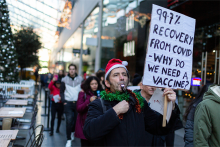
This new survey found a remarkable number of Americans reporting serious family conflict over COVID-19 vaccinations. Fully one in five Americans (19 percent) say that disagreements over COVID-19 vaccinations have caused “major conflict” in their families. Similarly, earlier this fall, PRRI found that 22 percent of Americans reported that their extended family relationships have been “strained to the breaking point” over the issue of getting a COVID-19 vaccination.

What rekindles our worship and wonder, causing us to reflect and repent, prompting us to hope and rejoice in this particular season of Advent? Perhaps the same spirit that moved abolitionists, advocates, and allies to pen our favorite holiday hymns can remind us of our reasons to rejoice.
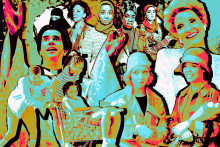
In season two of Ted Lasso, our favorite stubbornly positive coach struggles with anxiety. Unfortunately, the king of talking-it-out doesn’t initially trust talk therapy. In an uncharacteristic display of disrespect, Ted — who doesn’t want to dig up his past traumas — calls the work of the team’s sports psychologist, Dr. Sharon Fieldstone, “bullshit.” Somehow, Fieldstone keeps her cool. “I can’t be your mentor without occasionally being your tormentor,” she tells Ted.

Did you know jazz musician John Coltrane was canonized by the African Orthodox Church in 1982? Coltrane was canonized at the behest of a religious community in San Francisco which founded a church in his name, and St. John Coltrane Church is still alive and well today.

The season of Advent holds a special meaning for me because it reminds me of the power of a mother’s love. While I know “Jesus is the reason for the season,” I cannot help but shift my attention to the woman who brought him into the world — and what she had to endure to birth him.
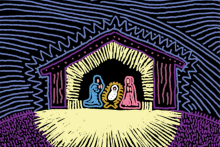
At its core, the Christmas story is radical. Christ enters the world in the form of a marginalized infant — a story about finding hope amid brokenness by pushing forward into the darkness. We cannot find the true light of Christmas without understanding what it means to be in the dark, opening our eyes to the injustices in our neighborhoods.

Spencer is the ultimate I-won’t-be-home-for-Christmas film. It is Black Swan meets Jackie meets (to a far lesser degree) the The Family Stone. Which feels poignant in 2021, a year in which many of us are afraid to go home. The omicron variant will undoubtedly keep some of us away from our families. But others who can travel home for Christmas may feel anxious about the prospect of returning to houses divided by politics, theology, misinformation, or all three.
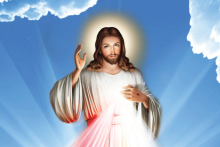
“Yassification” is a recent meme spreading across social media. To “yassify” something is to heavily edit the original image with multiple filters until the figure is blurred, airbrushed, and entirely unrecognizable. Many of these images come from Twitter user “@YassifyBot,” who primarily yassifies famous paintings, actors, and politicians. Religious leaders, however, are not immune from yassification: Pope Francis, Martin Luther, and Joan of Arc have all been yassified. Anyone can be yassified these days — even Jesus.
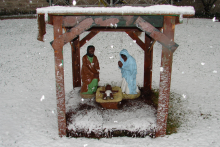
On white Christian mantels and white Christian church lawns across the country, nativity scenes continue to depict, in illuminated plastic and with robed volunteers, a white holy family surrounded by a throng of other white folks. If there is anyone in the scene with brown skin — and there wasn’t until the 15th century — it is one of the three “wise men” or kings (specifically Balthasar, the one bringing the gift of myrrh).

In Matthew 25:35, Jesus identifies himself with the stranger we welcome or exclude. Advent hospitality extends beyond our personal relationships and into the ways we structure our neighborhoods and our common life. But in the United States, our politics are driven by “NIMBYism” (“not in my backyard!”), as housed individuals and politicians not only demand the exclusion of unsheltered people from public spaces but also oppose the creation of shelters and permanent, affordable housing in our neighborhoods.

Christians believe that God’s reign of righteousness, steadfast love, peace, and justice is not just a promise relegated to the future. Instead, we see glimpses of that heaven in the here and now, even as we face the realities of suffering and grief all around us. This means that Christ’s birth in Bethlehem makes it possible for us to co-labor with God in yanking pieces of heaven and bringing them closer to Earth.
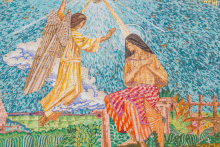
As I observed and engaged in the multifaceted conversations about abortion, I came to a stark realization: In the story of the Annunciation, God reveals the importance of consent, agency, and women’s rights. This season of Advent presents us with the perfect opportunity to look at the Annunciation from this perspective.
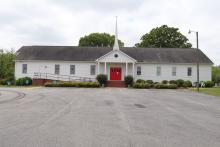
The Great Resignation is underway in the United States with an astounding 3 percent of employees collectively refusing the terms of low-wages, absent benefits, and dangerous working conditions expected by their bosses. Pastors, too, are walking away. Recent poll data collected by Barna Group, a California-based research firm that studies faith and culture, confirmed what I’m seeing among my friends and colleagues. According to Barna, about 38 percent of Protestant senior pastors surveyed have considered leaving ministry over the past year. Among pastors under age 45, that number rose to 46 percent.

My favorite part of Thanksgiving is the leftovers. If we’re being honest, most of the food tastes better the day after the feast. Cranberry sauce becomes a sandwich spread, ham goes into a breakfast taco, bones go into a pot to make enough broth for several weeks of soup. Some happenings are so big that there’s always much leftover.
But not all leftovers are good. Trauma, for instance, can linger for months or years after the initial act of violence.

Earlier this month, Secretary of Transportation Pete Buttigieg made headlines by announcing that the recently-passed $1 trillion federal infrastructure bill will be used in part to address racial inequities in U.S. highway design. “If a highway was built for the purpose of dividing a white and a Black neighborhood, or if an underpass was constructed such that a bus carrying mostly Black and Puerto Rican kids to a beach … in New York was designed too low for it to pass by, that obviously reflects racism that went into those design choices,” he said.
A number of Americans were confused — how can concrete and paint be racist? But Buttigieg is correct: Highways and bridges are examples of structural racism literally built into the American cityscape. Reconstructing more equitable cities will require prophetic imagination and real, political solutions. They will vary from city to city. From suburb to suburb. So if you’re looking for a place to start, look in your own neighborhood.
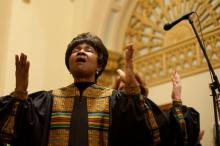
Black women have been historically marginalized both in the church and society — and this trend continues today in theological education as well as the church. Neither the church nor the world of theology will survive if things continue in this direction.

Even with the mass upheaval of our societal patterns and expectations brought by the pandemic, and the spread of global protests against racism and police brutality, our material conditions are not changing at the pace of our rhetoric.

The United States, regrettably, is still struggling to right the longstanding racial bias in our courts and policing. But one area we have entirely failed to examine is who gets labeled as a “gang” and what gets labeled as “gang activity.”
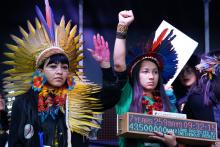
Colonial logic, when applied to political systems, protects power and controls the public narrative. When world leaders use generic terms like “humanity” or phrases like “all humans are responsible for the crisis,” it conceals the responsibility of governments and large corporations. By pointing to humanity in general, they imply that we are all equally responsible for the climate crisis and invisibilize the efforts of Indigenous leaders in the fight for climate justice.

The film opens when Venus and Serena are already near teenhood and tennis stardom. We don’t suffer through scenes of the two first learning to swing a racket, and this allows the movie to focus on the true challenge the sisters faced: the classism and racism of rich, white, tennis institutions that had little time for two Black girls from Compton, Calif. — an issue that has improved but still exists in U.S. tennis.